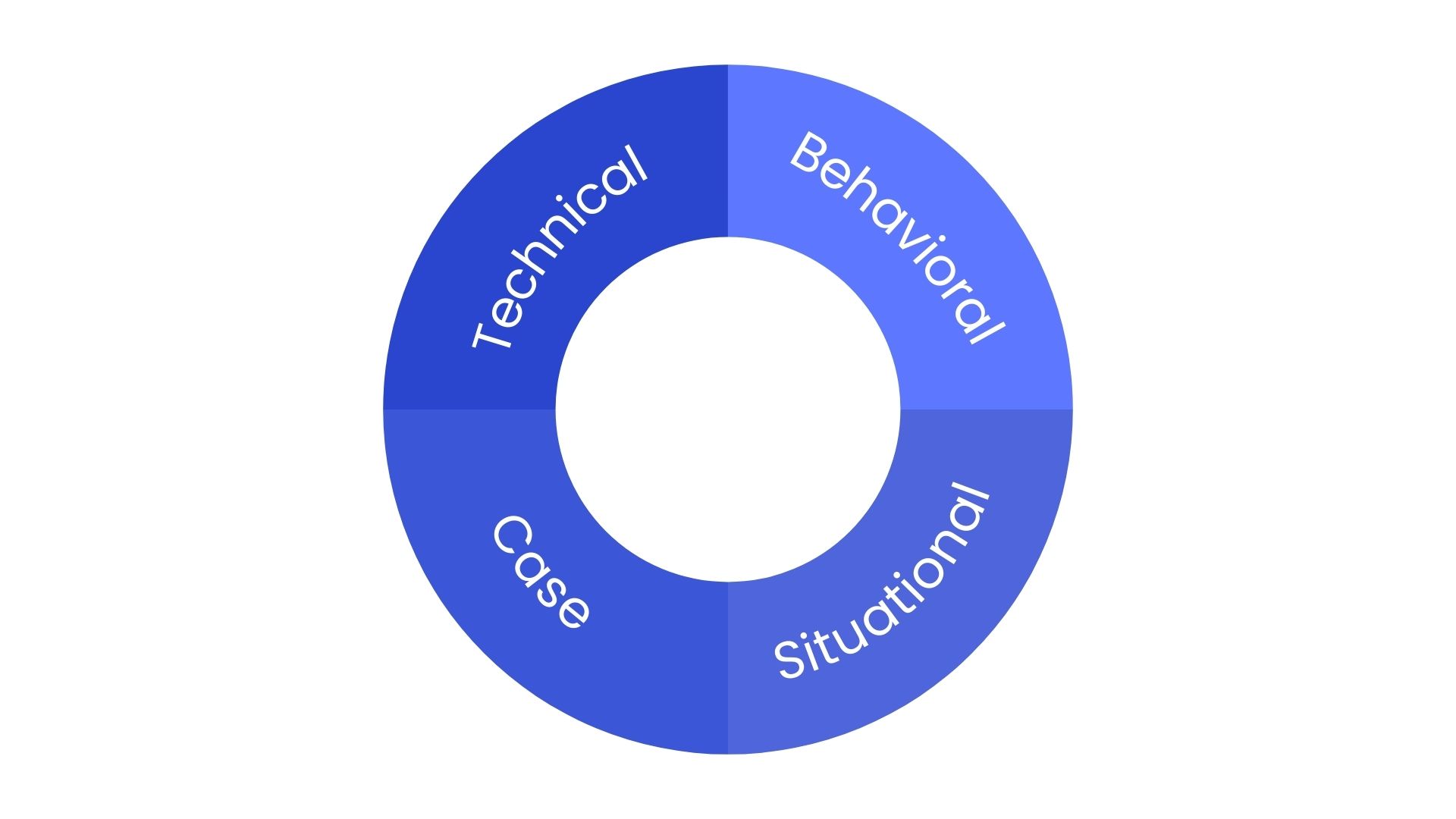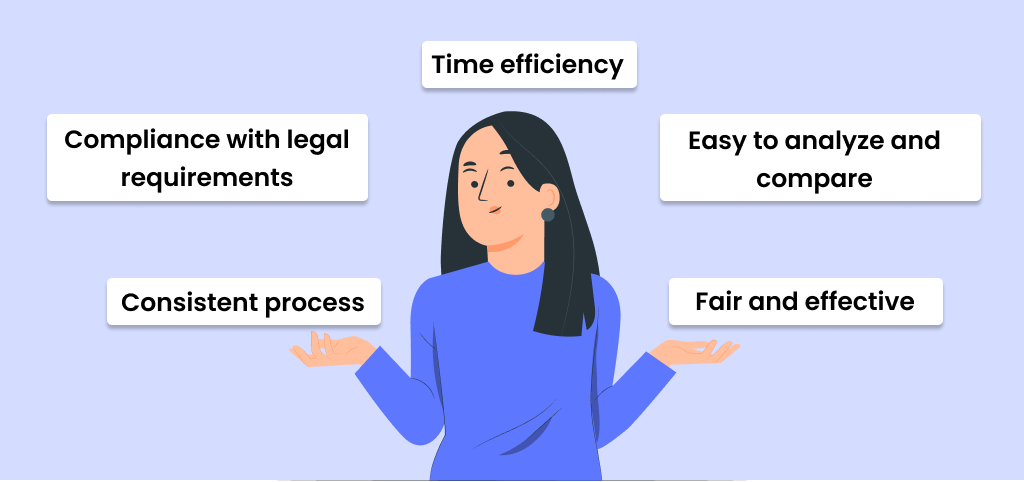A structured interview is a process where a candidate undergoes a series of predetermined tasks designed to assess their competency for a specific job. This may involve answering direct questions, solving case studies, or participating in role-based simulations and group activities. Their performance is evaluated against a fixed scale.
This standardized interviewing method, whether conducted face-to-face or virtually, proves especially effective when multiple interviewers are assessing numerous candidates for similar positions.
Consider a consulting firm aiming to fill 10 Analyst positions from a pool of 100 candidates. To manage this efficiently, the firm requires several interviewers. Without a standardized interviewing process, subjective biases and preferences of individual interviewers could skew the fairness and objectivity of the recruitment process. In such scenarios, a structured interview is far more reliable compared to an unstructured one.
By utilizing structured interviews, companies can ensure a more equitable and effective recruitment process, significantly enhancing their ability to identify the best candidates for the job. This approach not only streamlines the hiring workflow but also supports strategic talent acquisition, crucial for maintaining competitive advantage in the global marketplace.
Steps involved in a structured interview
Determine the interview format
The interview format must focus on their past as well as anticipated behavior. It helps in developing structured interview questions for the candidates. It could be behavioral, situational, or a combination of both. It helps to assess many aspects of an individual’s performance. You can watch interview videos in both formats for better clarity on this issue.
Determining the rating scale
A well-defined rating scale is an integral part of a structured interview. It helps assess all the candidates who have applied for the job role. The rating scale is different for behavioral assessment and situational interviews. This method helps to assess the different skill sets required to clear those tests.
Choose the right structured interview type
Based on the job requirement and the company culture, decide which type of structured interview will be most effective. If the role requires innovation and problem-solving, a situational interview might be appropriate. For roles requiring interpersonal skills and teamwork, a behavioral interview could be more suitable. Understanding the specific demands of the job helps in selecting the right interview format, optimizing the hiring workflow.
Types of structured interviews

As previously discussed, structured interviews can differ based on their method of assessment. Here’s a detailed look at each type, emphasizing how each supports the recruitment process and aids in effective talent acquisition.
Behavioral interviews
These interviews focus on how the candidate has handled specific situations in the past, offering insights into future behaviors and suitability for the role. By analyzing past actions, interviewers can predict how the candidate might contribute to the company’s goals and culture.
Situational interviews
These involve hypothetical scenarios presented to candidates to assess how they might handle particular challenges related to the job. This type of interview is particularly useful for roles requiring critical thinking and adaptability, helping HR managers understand a candidate’s problem-solving capabilities.
Case interviews
Commonly used in consulting firms, these require the candidate to solve a business problem, showcasing their analytical and decision-making skills. It’s a practical demonstration of how the candidate approaches complex situations, providing clear insights into their professional competency and fit for the company.
Technical interviews
Especially relevant for tech roles, these interviews assess specific technical knowledge or skills through problems, coding tests, or detailed discussions. They are critical in the hiring process for positions that require specialized technical expertise.
Each type of structured interview is tailored to evaluate candidates in a manner that aligns with the specific demands of the job. By selecting the appropriate type of structured interview, companies can enhance their hiring workflow, improve the hiring process, and ensure that they select the best possible candidates for their needs. Employing an Applicant Tracking System (ATS) can further streamline this process by organizing candidate screening and interview scheduling efficiently.
Why Conduct Structured Interviews

Structured interviews offer several advantages for both the hiring process and overall talent acquisition strategy, making them an invaluable tool in modern human resources management.
Consistent process
Structured interviews provide consistency across all candidates. Each interviewee answers the same questions and is evaluated using the same rating scale, greatly reducing bias. This uniformity ensures that a candidate’s performance is judged on merit rather than subjective impressions, enhancing fairness in the recruitment process.
Time efficiency
These interviews are time-efficient due to their standardized nature. Whether conducted online or face-to-face, the streamlined approach speeds up the evaluation, allowing for quick and efficient candidate screening.
Easy to analyze and compare
With all candidates assessed on a uniform scale, it becomes simpler to analyze and compare their scores. This consistency is maintained regardless of the interview being live, digital, or via recorded video, ensuring reliable comparisons across various hiring modalities.
Fair and effective
By minimizing personal biases, structured interviews allow for fairer and more effective recruitment decisions. The standardized evaluation method means that decisions are based solely on candidate performance, aligning with best practices in human resource management.
Compliance with legal requirements
Adhering to legal standards is simpler with a structured interview format. This consistency helps ensure compliance across both physical and online interviews, safeguarding the company against potential legal challenges.
How Does an ATS help with the Interview Process
By implementing an Applicant Tracking System (ATS), you can eliminate paper-based processes and streamline your human resources function. The use of an ATS will help to reduce the time and cost associated with interviewing and recruitment activities, as well as the time spent on compliance and reporting.
PyjamaHR is one such ATS that stores every piece of information about each applicant, as well as collects data from multiple sources. The result is a comprehensive system that streamlines the overall hiring process, while at the same time providing broader insight into candidates’ qualifications, personalities, and compatibility with your company.
Conclusion
Structured interviews streamline the recruitment process, ensuring fairness and consistency across all candidates. By integrating techniques like behavioral, situational, and competency-based questions, organizations can accurately assess each candidate’s fit for specific roles. Additionally, using an Applicant Tracking System (ATS) like PyjamaHR further optimizes hiring workflows, saves time, and maintains compliance. This approach not only improves hiring decisions but also supports a workplace culture of fairness and efficiency.


